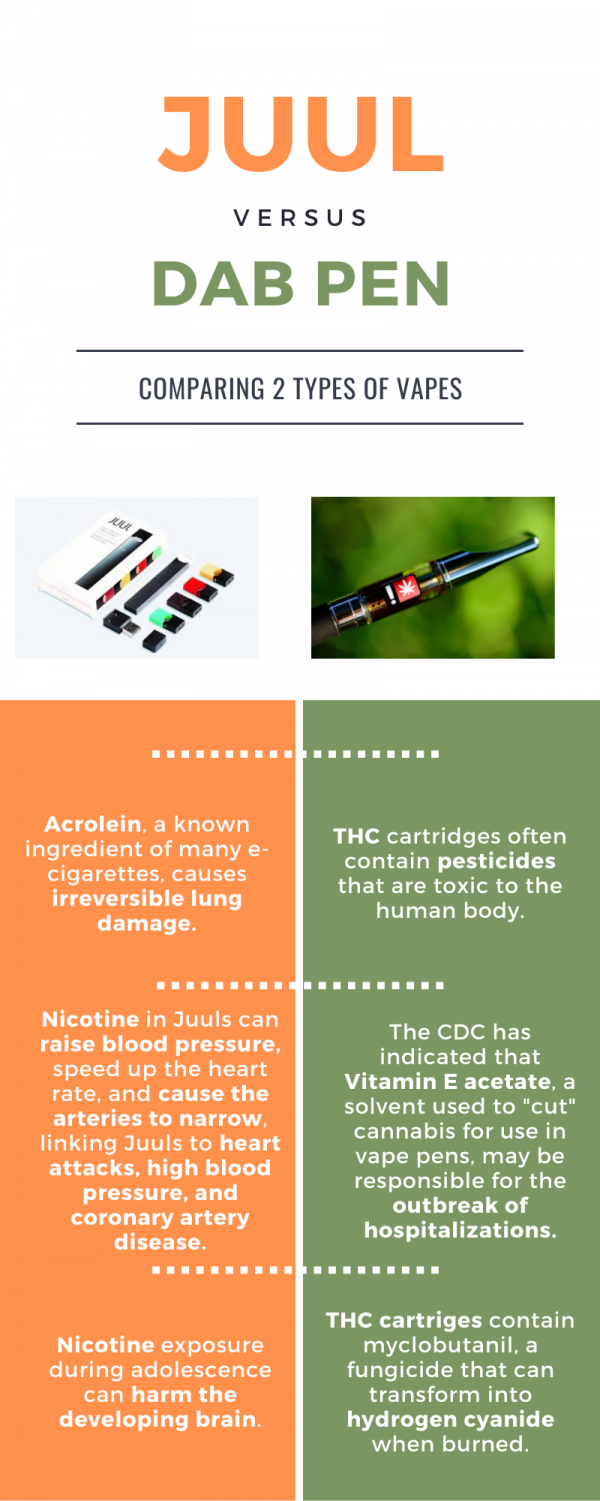Is JUUL the Scapegoat for Dab's Crimes?
Students and adults reaching for an explanation for vape-related illness blame “vape,” but that term is more diverse than some realize.
November 12, 2019
In early August, the course of Simah Herman’s life changed forever. Something was wrong as she gasped for air in the backseat of a car and her father raced to the nearest hospital.
“I just remember feeling like absolute…nothing. Like I just couldn’t do anything,” Herman, 18, said. “I couldn’t drink water. I couldn’t move. Like, I literally just wanted to crawl out of my skin.”
The doctors ran test after test, but could not discover the source of her symptoms. After putting Herman into a medically induced coma, they unearthed her history of frequent Juul use, which had increased to needing a hit every 10-15 minutes. The doctors later realized that if she had not been admitted to the hospital that day, she may have died.
Herman’s story is just one of the latest stories in a string of vape-related events. As of October 17, there have been thirty-three confirmed vaping related deaths and over 1,479 cases of lung illness in thirty-three states associated with e-cigarette products, according to the Centers for Disease Control and Prevention (CDC).
An unnamed man from Tulare County, California was one of those who died from complications related to the use of e-cigarettes, which was concluded by county health officials after his death. One of his family members disclosed to the public that he was a user of both nicotine-based e-cigarettes (like Juul) and THC vaping products (like dab pens) — which of the two vaping products caused his death is unknown.
County health officials who determined the cause of death have been quick to point their fingers at Juul, the most popular nicotine-based vaping product according to CNN. However, the CDC shared that, “in addition to nicotine, patients also reported using e-cigarette products with liquids containing cannabinoids like THC, the active compound in marijuana.” Because of this ambiguity, Juul refuses to pause their sale of e-cigarettes. Burns, CEO of the Juul company, said he does not yet know if they are at fault for the lung illnesses, and he believes the issues are mostly due to vape pens with THC, colloquially called “dab pens.”
Dab pens are illegal in Texas and thus can only be obtained from an unregulated source or homemade. When these means are used, the pens may be loaded with residual solvents, like butane, pesticides or other contaminants and carcinogens. A recent study from the CDC found that over eighty percent of dab pens are contaminated by solvents or pesticides to some degree.
The exact reasoning behind why these cartridges can be filled with poisonous substances remains unknown; however, scientists hired by the CDC suspect that the seller may insert these chemicals to meet the required weight of the THC cartridge demanded by consumers. This minimizes production costs and maximizes profit, at the cost of those consumers.
The ambiguity of recent vape-related health problems presents a puzzle being addressed by government agencies and private corporations alike to prevent further vape-related deaths. Herman, mentioned earlier, started an anti-vaping campaign after her time in the hospital, joining larger anti-vaping campaigns like Truth in fighting vape use.

JUUL and Dab Pens each carry their own risks. These are some of the most serious side effects according to lung.org.
The CDC tested lung fluid from different patients who used vape-related products and found that 29 of these samples contained a common chemical: vitamin E acetate. This connection marks a breakthrough in the recent vape- related lung injury investigation. Vitamin E acetate is an oily substance found in a multitude of household items including various foods, supplements, and creams. Vitamin E acetate is not harmful to human health when used in these products, but research conducted by the CDC found that when it is inhaled (such as through vape products), it “may interfere with normal lung functioning.” This oil is extremely attractive to those manufacturing illegal products because it mimics the THC oil found in dab pens. Investigators believe the substance has been added to many THC cartridges, harming users. In the study conducted, 82 percent of the lung fluid samples from vape-users contained vitamin E acetate while 62 percent contained nicotine, suggesting that while many patients were using both THC and nicotine products, vitamin E acetate found in THC cartridges is slightly more dangerous.
Professionals agree that both dab pens and Juuls are detrimental to the users’ health; however, recent studies conducted by the CDC show that dab pens are far more harmful than nicotine-based products like Juul. This is not because of the THC, but rather the chemicals and pesticides found in many cartridges. Research has shown dab pens do contain more directly harmful ingredients than Juul and other vapes, however stories like Herman’s point to a harmful trend in Juul use. Though most information about the harmful effects of vapes go unknown due to their young age, recent discoveries pertaining vaping-related illnesses show tremendous development in the comprehension of the health effects of these products.
hairy girl долгосрочный займзайм на киви кошелек мгновеннозайм под 0 процентов займ на долгое время1000 рублей займзайм на карту в москве
















